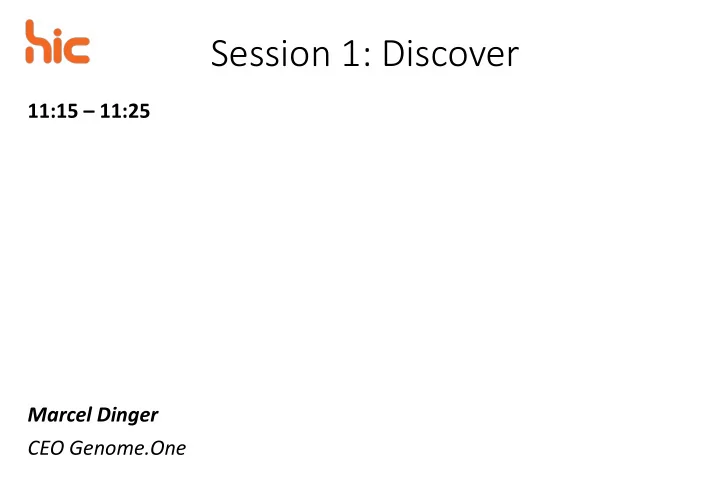

Session 1: Discover 11:15 – 11:25 Marcel Dinger CEO Genome.One
Genomics in the clinic: Transforming healthcare and medical research Precision Medicine Workshop HIC 2017, Brisbane 7 August 2017 Marcel Dinger Chief Executive Officer, Genome.One Head, Kinghorn Centre for Clinical Genomics Garvan Institute for Medical Research, Sydney, Conjoint Associate Professor, UNSW Australia
RAPID EVOLUTION OF GENOMICS TECHNOLOGY
NOT “JUST ANOTHER TEST” Whole genome sequencing • Replaces 1000s of existing genetic tests • Permits hypothesis-free diagnosis • Capacity to re-analyse data • High research value of data • Applications outside of medical system
GENOMICS IN WHOLE OF LIFE HEALTHCARE Carrier screening Pre-implantation screening Fetus (NIPT) Newborn screening Paediatric disease diagnosis Disease predisposition Rare disease diagnosis Pharmacogenomics Infectious disease diagnosis Cancer diagnosis Cancer treatment guidance Molecular autopsy
TWO-WAY FLOW OF INFORMATION
GENOMIC MEDICINE: WHAT ARE THE OPPORTUNITIES? 1. Genetic disease. Diagnosis of rare and inherited disorders. 2. Cancer. Molecular stratification to guide treatment (precision oncology). 3. Disease prevention and treatment personalisation. Predisposition testing, carrier testing, optimisation and avoidance of adverse drug reaction.
PRECISION MEDICINE REQUIRES CLOSE INTEGRATION BETWEEN MEDICAL RESEARCH AND CLINICAL CARE
PRECISION MEDICINE REQUIRES CLOSE INTEGRATION BETWEEN MEDICAL RESEARCH AND CLINICAL CARE
BENCH TO BEDSIDE AND BACK AGAIN Alan’s illness has been held at bay through the power of genomic information • Alan has a life-threatening immune disorder • diagnosis through trio whole genome sequencing • research consortium accessed recently-published evidence of drug efficacy • Abatacept (immune inhibitor) prescribed • Alan’s red blood cells and platelets rebounded into normal range and he is now less vulnerable to infection • Issues remain with his gut, but the diagnosis and drug treatment have been life-changing for Alan and his family
BENCH TO BEDSIDE AND BACK AGAIN With genomic information, Garvan researchers are trying to turn Alan's partial fix into a complete one. • with knowledge of the genetic variants in the LRBA gene, mice ‘avatars’ of Alan have been made • Research continues into his disorder through the Clinical Immunogenomics Research Consortium Australia (CIRCA) at Garvan
ESTABLISHING A LEARNING HEALTHCARE SYSTEM Using population health analytics to inform precision healthcare requires: 1. Standardised, dynamic, portable consent 2. Standardised clinical data 3. Analytics to infer new genetic associations with clinical characteristics 4. Machine learning algorithms to optimise clinical decision-making based on population- health data 5. Consumer awareness to maximise effectiveness
EMERGING ISSUES IN HEALTH INFORMATICS IN REALISING PRECISION MEDICINE 1. Clinical decision support systems are a key component in precision medicine. What is our readiness for this transition where medical guidance is shifted from pathology to the clinician’s desktop? 2. Precision medicine relies on deep linkages between research and clinical systems. How will these entrenched barriers be removed? 3. Genomics data is large and is most valuable when shared across networks. How and where should data be stored?
Recommend
More recommend